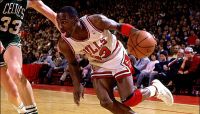Michael Jordan. Ever heard of him? The winner of the Most Valuable Player five times, Mr. Jordan was one of my heroes growing up. While I am sure he loved winning the MVP all of these years, would he have liked the minimum viable product (“MVP”) of the lean start up methodology? What on earth is that anyway?
The MVP theory says that before you put your head down for months, or even years, developing a fancy business plan with the likes of Harvard, Chicago, or Stanford MBAs, you should first test the idea via an MVP. Say you are seeking to develop a social networking platform that will require retention of a large data base of names, and that the software you are creating will require much effort — and funding — to create. Before you create the whole network, you may want to make a sample that is big enough to get feedback from the marketplace as to functionalities that will be well received, and others that will not, before you create the whole.
When he entered the NBA, Mr. Jordan was criticized and cajoled for having larger shorts than anybody else in the NBA, and for also sticking his tongue out when he played. If he abided by the MVP method, would he have continued? Or what about Steve Jobs, when he sought to make your personal computers pretty, instead of the regular drab look that IBM was creating at the time? Would he have continued on his path if, after being ousted by the board of Apple for spending too much on hardware design, he sought approval from the market via an MVP?
Probably not. As I covered along with Silicon Valley Software Group in our first panel discussion, entitled Choosing the Right Technologies for Your Next Product, at San Francisco’s General Assembly on April 2, the MVP was created in reaction to the “build it and they will come” ideology. Einstein said “religion without science is blind” and so, too, building hardware or even software without any idea of what the market will or will not like is like flying in the dark with no radar.
But the reason why we call certain people innovators is that, in some ways, they can see in the dark. They are ahead of the market, close enough to get its energy, but not so close so as to be eaten up by it. The shortcoming of the MVP is that, if you are really looking to make a big bang, the positive relationship between risk and reward says that, in the end, you need to be aware of where the market is, but also have faith in your vision of where the market is going to be.
Now, most NBA players wear the larger shorts that Jordan sported when he first came into the league, and Apple is the largest company, in terms of capitalization, of the United States. MVP has its place in terms of spending scarce venture capital funds in an efficient way, but too much worshipping at its feet will make us all followers and diminish innovation.

